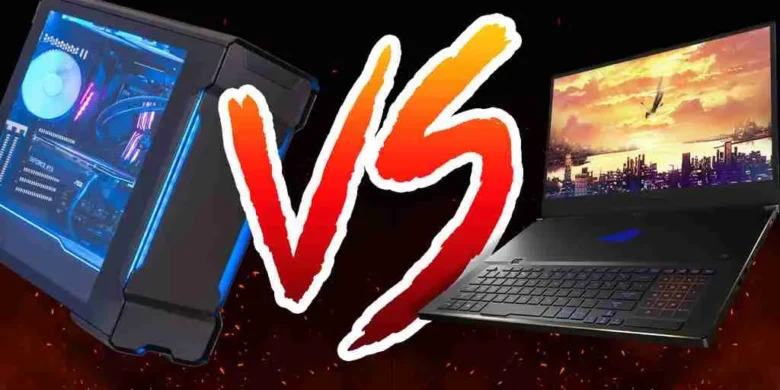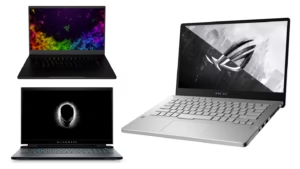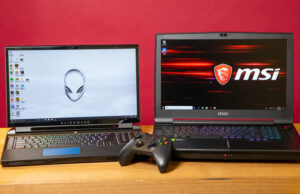Gaming laptops provide on-the-go performance that desktop PCs simply can’t match. If portability is important to you, or you plan to participate in LAN parties and esports events, a laptop could be your perfect gaming solution.
Desktop gaming systems still boast some significant advantages over their laptop counterparts. We will explore some key differences between the two in terms of power, customizability, value, and more.
Portability
One of the main draws of gaming laptops over desktop PCs is portability. Thanks to compact yet powerful systems being more compact and lightweight than ever, gamers can take their favorite graphics cards, processors, storage capacity and storage media with them almost anywhere they go – which makes gaming laptops particularly ideal if traveling often, gaming at home or attending LAN events is part of your lifestyle.
However, it’s important to bear in mind some potential tradeoffs when choosing your laptop computer. For example, battery efficiency varies widely among models – manufacturers’ estimates that claim you can play for hours without plugging in are often unrealistic in practice – and using a docking station adds cost and complexity.
However, certain gaming laptops make it challenging to replace or upgrade components, including memory slots. Even if you can gain access to them, doing so could damage the system and void its warranty. Conversely, desktop computers allow easy swapping out of hard drives or solid state drives for enhanced performance or accommodating additional games that often need large storage capacities. Furthermore, gaming desktops with open cases typically offer greater space for expansion and customization than closed-box laptops.
Customization
Gaming laptops provide unparalleled portability compared to desktop PCs, particularly thanks to recent designs that are more compact. This makes them the ideal option if you want to enjoy playing on-the-go or at places you wouldn’t bring a desktop, such as coffee shops or airplanes.
Yet laptops also limit how much you can customize your machine; many of the components inside are locked down and require special tools for access, and their compact form factor limits where and how you can install new components.
However, external peripherals can help enhance the performance of gaming laptops. Some laptops allow you to attach separate displays, while some come equipped with USB-C ports to easily attach desktop monitors, gaming mice or keyboards.
Some gamers enjoy the fun and challenge of building and upgrading their own computer rig. This can be accomplished both with laptops and desktops; desktops tend to make this task simpler because memory, GPU and motherboard upgrades can all be added or changed on-demand.
Overall, desktops provide greater value for your money than gaming laptops; however, that’s before taking into account the price of monitors, keyboards and mice. But with some customization efforts you could easily turn a gaming laptop into something just as powerful and enjoyable to use as its desktop counterpart.
Performance
Gaming laptops were once far outshone by desktop systems; but thanks to advances in CPU and GPU technologies, that disparity is far smaller now.
However, for maximum performance from your computer, desktop PC is still your best bet. You can add additional RAM and storage, swap out components as necessary, as well as install an external graphics processing unit (eGPU) for improved laptop performance.
Gaming laptops can be the ideal solution if space in your home is limited and you need something portable – for tournaments and LAN events! Plus, no hassles with connecting extra equipment like monitors and keyboards will need to be connected separately!
Though gaming laptops have never been more powerful, their battery efficiency often falls short of that of productivity notebooks. Most gaming laptops only last an hour or two without being connected to power before needing recharged; for long gaming sessions without charging stops desktop systems will provide superior battery life; you can even select one with more storage for your games and files for even greater mobility without losing data!
Value
Even with all of the innovations in gaming laptop technology, desktop PCs still offer greater system performance and ROI. If you want the maximum value from your purchase, a custom-built desktop is your answer.
However, if you’re willing to spend a bit more for convenience, a gaming laptop could be the right solution for you. Most modern high-end gaming computers are capable of matching desktop rigs in terms of performance while eliminating separate monitors, keyboards and mice from your budget.
Gaming laptops provide significantly more storage than desktop PCs due to their smaller form factor. Most gaming laptops provide up to 3TB SSD storage – far beyond what can be stored on standard hard disk drives.
Gaming laptops tend to provide more ports than gaming desktops, with available space varying by model. Most models typically offer HDMI, Ethernet and multiple USB-A and USB-C ports.
Consideration should always go into purchasing gaming computers; both laptops and desktops contain numerous moving parts that need to work together for maximum value. When choosing between laptops or desktops, research current trends in processors, GPUs and storage technologies as part of your purchasing decision to find an option that meets both your needs and budget requirements.




